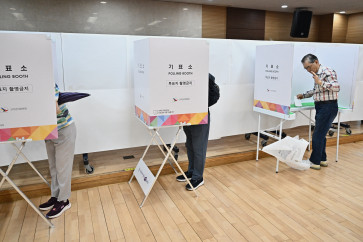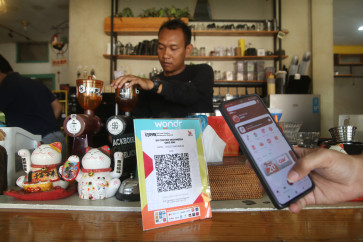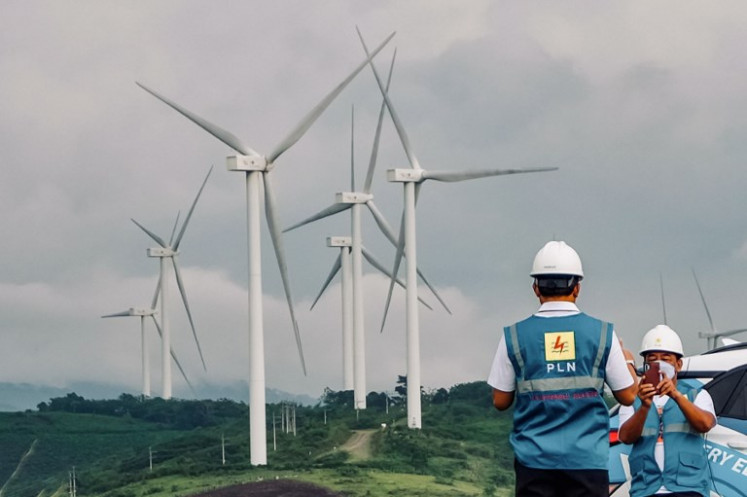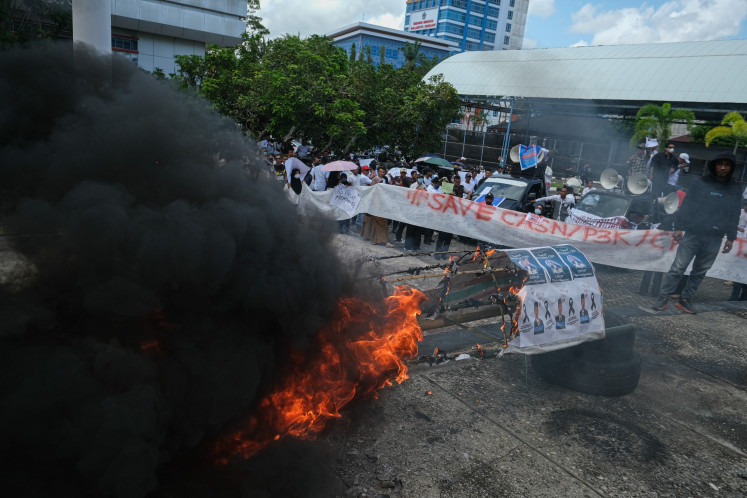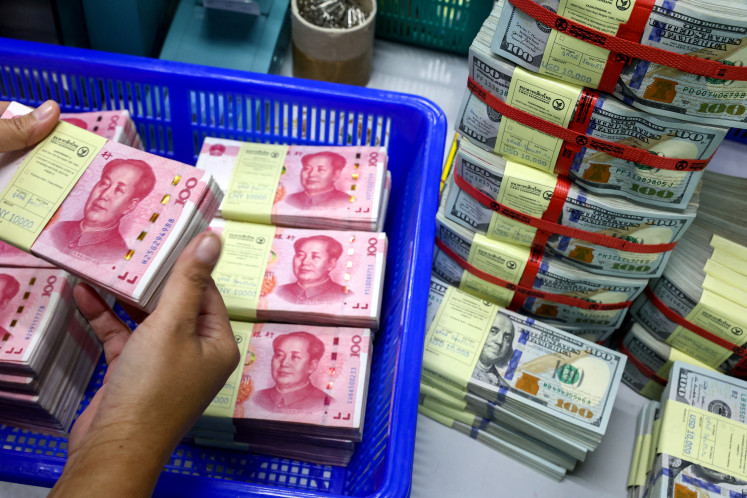Timor-Leste's independence: Not just a matter of precedence
Eleven years ago today, May 20, 2002, president Megawati Soekarnoputri undertook her first state visit to Timor Leste to participate in the new nationâs Independence Day celebration
Change text size
Gift Premium Articles
to Anyone

E
leven years ago today, May 20, 2002, president Megawati Soekarnoputri undertook her first state visit to Timor Leste to participate in the new nation's Independence Day celebration. This was a controversial domestic issue that Megawati had to face. But the decision was made that the president would attend a midnight ceremony at the Taci Tolu, Dili alongside VIP guests from other countries.
Two months later, Timor Leste president Kay Rala Xanana Gusmão also paid a state visit to Jakarta, while second president José Manuel Ramos-Horta, after assuming office in May 2007, selected Jakarta for his first state visit abroad. In addition, last year President Susilo Bambang Yudhoyono attended the 10th Anniversary of the Restoration of the Independence in Dili, and this was his second state visit.
Abdurrahman Wahid, after taking power from President B.J. Habibie, in February 2000 had made it his first priority to visit Dili when Timor Leste was still administered by the United Nations Transitional Administration in East Timor (UNTAET). Meanwhile Timor-Leste's prime minister Mari bin Amude Alkatiri ' who also acted as Secretary General of the Fretilin Party ' had received a warm welcome in Jakarta from president Megawati and members of her Cabinet in June 2003.
Most Indonesian people are familiar with Xanana Gusmão, Ramos-Horta and Mari Alkatiri, the neighboring country's well known and charismatic leaders. They are the founding fathers of Timor Leste and alongside the Indonesian leaders of the post-Soeharto era, they have worked hard to build a strong relationship on the basis of forward-looking policies, a commitment they have made at the highest political level.
It is most likely that Indonesian government officials, members of The House of Representatives and business circles have limited knowledge of Timor Leste's third president. The president, in accordance with Timor-Leste's Constitution, is largely a ceremonial and prestigious post that has a symbolic role, but the current President, José Maria Vasconcelos, popularly known as Taur Matan Ruak is not only the neighboring country's Head of State since May 20, 2012 but also a veteran of the country's 24-year war of independence against Indonesia.
Back in 1986, Taur Matan Ruak was promoted to Deputy Chief of Staff of Fretilin's armed wing and was responsible for all operations throughout East Timor, the same period that Yudhoyono was the Commander of the 744th Battalion in the territory. He was Chief of General Staff of the Timor Leste Armed Forces (F-FDTL) prior to his presidency, a relatively young figure, who along with other young politicians were potential leaders of the country to replace the big three (Gusmão, Horta, Alkatiri) in Timor Leste politics.
_______________
Prime Minister Xanana Gusmão's government has already shown progressive work to convince the ASEAN Coordinating Council.
The President's tasks are not directly linked to diplomacy, but the new generation of leaders, including Taur Matan Ruak himself, should notice the common practice of paying reciprocal visits, which was practiced by his predecessors.
Australian former foreign minister Alexander Downer has warned his country (adelaidenow.com.au/news) that once Yudhoyono completes his term as President, it will be the end of a golden era for Australia. Downer is right that Australia has to make the most of this critical period. It seems that Timor Leste has to think the same. No one knows yet who the next Indonesian president will be. It remains unclear whether Yudhoyono's successor will be a senior politician, or from a younger generation selected from his party's convention, or a 'strong' figure with a military background, particularly with East Timor experience.
Although as a President Taur Matan Ruak does not have an executive function, he could take the initiative as his predecessors did. Bearing in mind that the two governments still have pending matters, such as the proposal on integrated economic development in the oil and gas sector, the promotion of Indonesia's exports to several countries through Timor Leste and the supply of materials for Timor Leste's major airport, seaport and power plant projects.
Other matters, such as border disputes, bilateral trade and other sensitive issues could also be discussed. On ASEAN's membership question, Prime Minister Xanana Gusmao's government has already shown progressive work to convince the ASEAN Coordinating Council, while Indonesia has encouraged ASEAN to immediately decide on Timor Leste's membership in the organization. Within the existing limited time and the tight schedule of both sides therefore, the meeting should be held this year, the sooner the better, since Yudhoyono's term will come to an end in just over a year's time.
As a matter of fact, Francisco (Lu-Olo) Guterres ' once President of the Fretilin Party ' was criticized by many that during his five years in office as Speaker of the Timor Leste National Parliament (2002-2007). He never visited Indonesia or reached out to members of Indonesia's legislature, although it is neither tradition nor precedence for a parliamentary speaker to do so, but the reciprocal visits by a president-elect or a new prime minister among ASEAN members are essential as a common practice or tradition. And the visit of the Timor Leste President to Jakarta is not merely a matter of precedence.
The writer was Indonesia's representative to UNTAET (2000-2003) and is a guest-lecturer of the University of Gadjah Mada, Yogyakarta.

